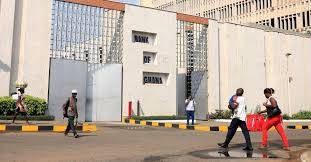Breaking News: Ghana's Central Bank Shakes the Financial Market with Surprising Interest Rate Decision!"
The recent decision by the Bank of Ghana to raise its prime interest rate to a staggering 28% has sent shockwaves through the financial landscape of the country. This bold move has sparked intense debate, drawing both concern and praise from various economic experts and stakeholders. The decision, which was announced following the Bank's Monetary Policy Committee (MPC) meeting, reflects the institution's ongoing battle with persistent inflation, economic recovery, and currency depreciation. However, the decision was not without its controversies, as it resulted in a split vote among the committee members.
In this blog post, we will take a deep dive into the implications of this interest rate hike and what it means for the people of Ghana, the businesses, and the overall economy. Let’s break it down.
Understanding the Decision: What Happened at the MPC Meeting?
The Bank of Ghana’s Monetary Policy Committee met recently, and the outcome of this meeting was far from ordinary. While the MPC is responsible for setting key interest rates, the recent decision to hike the rate to 28% was highly significant. This rate hike aims to curb inflation, stabilize the currency, and address the pressing concerns about the country’s economic challenges.
The decision was passed with a split among the committee members, which is unusual. The split reflects the differing views on how best to tackle the country’s fiscal problems. Some members of the MPC favored an even higher interest rate to tame inflation further, while others believed that a more conservative approach would have sufficed. This division within the central bank shows just how difficult it is to balance economic growth with the need for stability.
What Does This Interest Rate Hike Mean for Ghana's Economy?
A prime interest rate of 28% is unprecedented for Ghana, and its implications cannot be ignored. But how does this decision affect the everyday person, businesses, and the government?
1. Impact on Loans and Borrowing
When the interest rate increases, borrowing becomes more expensive for individuals and businesses. For consumers, this means higher costs for personal loans, mortgages, and car loans. For businesses, it means that accessing capital for expansion, equipment, and operations becomes more difficult, which could dampen growth. Small and medium enterprises (SMEs), which are the backbone of Ghana's economy, are likely to feel the pinch the most.
However, the government has argued that the interest rate hike is necessary to curb inflation, which, in the long run, could stabilize the economy and bring down borrowing costs. But this will take time, and in the short term, businesses might face difficulties in financing their operations.
2. Currency Depreciation and Inflation
The rate hike is directly tied to efforts to stabilize the Ghanaian cedi and reduce inflation. Over the past few years, Ghana has experienced significant inflationary pressures, which have driven up the cost of living. By raising interest rates, the Bank of Ghana aims to attract foreign investment, which should help stabilize the cedi and keep inflation in check.
However, inflation does not disappear overnight, and while the interest rate hike may slow down inflation in the long term, it could continue to cause some instability in the economy in the short term. Businesses may still struggle with high operational costs, and consumers may face high prices at the stores. But as the central bank has emphasized, this is a necessary step toward achieving long-term stability.
3. The Impact on Government Debt
Government debt in Ghana has been rising, and the interest rate hike will also affect how much the government has to pay to service its debts. With higher interest rates, Ghana will likely see an increase in the cost of borrowing from international lenders, particularly if the cedi continues to depreciate. This could put additional strain on the country’s fiscal space, especially as Ghana attempts to recover from the impact of the COVID-19 pandemic.
The IMF has already expressed concern about Ghana’s rising debt levels, and this interest rate hike is just one of the measures being put in place to address these concerns. However, with the country facing a high debt-to-GDP ratio, managing the burden of this debt while keeping the economy afloat remains a difficult balancing act.
How This Affects the Ghanaian People: Real-Life Impacts
The economic policy changes will not just affect business owners or investors. Ordinary Ghanaian citizens will feel the direct impact of the 28% interest rate hike in a variety of ways.
1. Cost of Living Increases
As businesses face higher borrowing costs, they are likely to pass those costs on to consumers. This could mean higher prices for goods and services, making it even more difficult for average Ghanaians to make ends meet. As inflation continues to rise, salaries that have not kept pace with the increasing cost of living will leave many families struggling to maintain their standard of living.
2. Challenges for Savers and Investors
On the flip side, the interest rate hike could benefit savers and fixed-income investors, who may see better returns on their savings accounts, government bonds, and other fixed-interest products. For those who are risk-averse and looking for a safe place to park their money, the higher interest rates could offer some relief. However, the overall economic uncertainty may overshadow this benefit for many.
3. Employment Opportunities and Job Growth
One of the biggest concerns regarding the interest rate hike is its potential impact on job creation. With businesses becoming more cautious in their borrowing, there may be fewer opportunities for expansion and growth. This could, in turn, result in fewer job openings and even layoffs in some sectors. As unemployment rates rise, the pressure on the government to create new jobs will become even more pronounced.
Why the Split Decision Among MPC Members?
The fact that the decision to raise interest rates was made with a split vote is noteworthy. While the majority of MPC members saw the rate hike as necessary to combat inflation and stabilize the economy, others expressed concern that the rate hike could stifle growth in the private sector. Those who voted against the hike argued that it could negatively impact businesses and lead to an economic slowdown, particularly for small businesses.
This split decision reflects the tough choices that central banks face when managing an economy in distress. Balancing inflation control with the need for economic growth is no easy task, and the Bank of Ghana is clearly walking a fine line.
Conclusion: What Lies Ahead for Ghana?
The 28% interest rate hike is a bold step in Ghana’s economic recovery journey. It is a policy move that carries both risks and rewards. While it may help stabilize the currency, curb inflation, and attract investment in the long run, the short-term effects could prove challenging for businesses, consumers, and the government.
As the Bank of Ghana continues to monitor the economic landscape, it will likely have to make further adjustments to its monetary policy. The road ahead is uncertain, but one thing is clear: Ghana's economy is undergoing a period of transformation, and these changes will have lasting implications for years to come.
Stay tuned for more updates on Ghana’s economy and how these decisions unfold in the coming months!
Call to Action:
Do you think the interest rate hike will help stabilize Ghana's economy or hurt growth? Share your thoughts in the comments below! Don’t forget to follow us for more updates on the latest developments in Ghana's financial and economic landscape!













Total Comments: 0